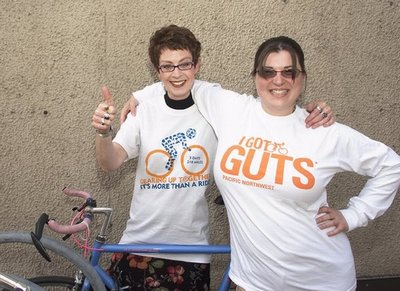June 21, 2007
‘Get Your Guts in Gear’
Two UW employees, Lois Fink and Miko Robertson, are among more than 1.4 million Americans who suffer from inflammatory bowel disease (IBD), the collective term for Crohn’s disease and ulcerative colitis. Through the nonprofit Get Your Guts in Gear, Inc. (GYGIG), Fink and Robertson are trying to raise public awareness of IBD.
“IBD is rarely talked about because of its often embarrassing symptoms,” Fink, assistant to the chair, UW Department of Oral Medicine, School of Dentistry, said. “Symptoms may include severe abdominal pain, bowel incontinence, diarrhea, cramping, bloody stools, fevers, lack of appetite, and delayed physical development if the disease becomes active during puberty.”
Crohn’s disease causes inflammation of the gastrointestinal tract, most commonly affecting the small and or large intestine. Ulcerative colitis is a chronic disease of the large intestine that causes inflammation and ulceration of the colon’s inner lining. When medical management of IBD isn’t effective, ostomy surgery is an often life-saving procedure in which all or a portion of the diseased large intestine is removed and the remaining intestine is brought through an opening in the abdominal wall. An ostomy pouching system, worn over the bowel or stoma, which is usually located on the right lower abdomen just below the belt line, collects fecal matter.
Get Your Guts in Gear, Inc. creates and produces bicycle rides across the country to help raise awareness and funds for research, education, patient support and advocacy. Each rider has to raise $1,900 to participate. Last year more than 60 people participated in the first ride in the Pacific Northwest. This year’s three-day ride takes place Aug. 3–5.
The ride brings together novice and experienced cyclists from all over the United States in a three-day adventure following a 210-mile route that provides views of the Cascades and Olympics from Whidbey Island, traverses through the lush Skagit Valley farmlands, and winds through the scenic back roads of Snohomish County.
Fink, 58, volunteered to provide emotional and physical support of the cyclists last year, and will do it again this year. She understands the emotional and physical needs of people who have the disease.
People who have Crohn’s disease or ulcerative colitis are focused on the bathroom —- Where’s the bathroom? Will I reach it in time before having an accident? Things many people take for granted, such as going to the movies, a restaurant, or strolling on the beach, can be a source of extreme anxiety. “There were days when I’d be completely bathroom-bound. I didn’t have a life. I was an observer,” Fink said.
After years of suffering from the disease and its accompanying anxiety, Fink decided to have ostomy surgery. She has been symptom-free for 21 years.
GYGIG rides not only raise much-needed awareness about Crohn’s disease and ulcerative colitis, “they empower individuals affected by these diseases,” said Judith Pacitti, GYGIG founder and ride director. “Whether the riders are patients, friends, family members or caregivers, the ride provides participants with the experience of overcoming physical and mental challenges within a supportive environment.”
Robertson, special projects manager in the UW School of Medicine’s Office of Research and Graduate Education, said last year’s ride was life-altering for her. After years of steroid treatment for her inflammatory bowel disease, Robertson, now 28, is being treated with an immuno-suppressant biologic called Remicade and other medications to keep her Crohn’s disease in remission.
A novice cyclist, Robertson rode in last year’s event with her brother.
“There’s a lot of camaraderie on the ride, even between novices and experienced cyclists. We camped overnight in tents, we had incredible food, and there are lots of Honey Buckets along the way, every 10 to 12 miles. We rode from 6 a.m. to 5 p.m.”
Robertson, who will volunteer at this year’s Pacific Northwest ride, said last year’s ride helped her overcome the lifestyle limitations of her disease.
“I wanted to prove that I could do it. I did it, and there’s something really profound about that.”
For more information about Get Your Guts in Gear, call 718-875-2123 or visit online at www.ibdride.org.



